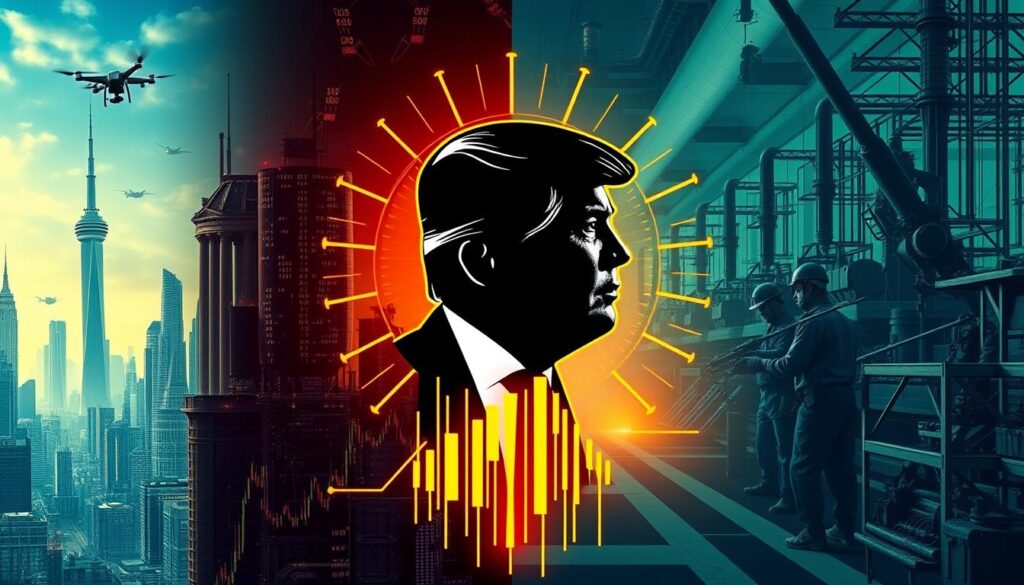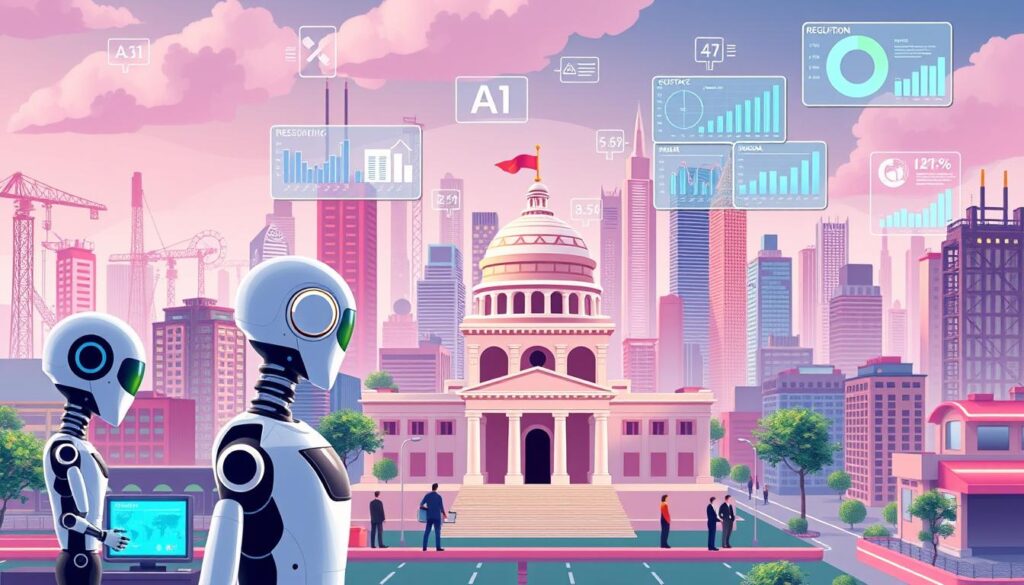What Was Trump’s Position on AI? Policies and Trends

When looking into Trump’s view on artificial intelligence, you see his team aimed to lead in AI growth. Trump’s AI policies were key in shaping the field. Knowing these policies is vital for anyone into AI.
Trump’s AI stance is best understood within his administration’s larger goals. His AI policies were meant to create a competitive space for AI tech. By diving into these policies, you learn how they’ve shaped the AI industry and its future in the U.S.
Key Takeaways
- Trump’s administration prioritized American leadership in AI development and deployment
- Trump ai policies aimed to drive innovation and growth in the AI sector
- Exploring policies and trend provides valuable insights into the impact of Trump’s initiatives
- Trump’s initiatives focused on promoting a competitive environment for AI development
- Understanding Trump’s stance on artificial intelligence is crucial for industry professionals and enthusiasts
- Trump ai policies had a significant impact on the AI industry, shaping its future and direction
The Evolution of AI Policy Under the Trump Administration
Understanding the changes in AI policy under Trump is key. The Trump administration aimed to lead in AI. They wanted to boost innovation and growth in the field.
Before Trump, AI policy was unclear and not well-coordinated. The American AI Initiative changed this. It focused on AI research, education, and infrastructure.
Key Changes Introduced During Trump’s Presidency
Trump’s presidency brought several important changes. These include:
- Establishment of the American AI Initiative
- Creation of the National Science and Technology Council’s Machine Learning and Artificial Intelligence Subcommittee
- Development of the AI for American Industry strategy
Major Policy Milestones
The Trump administration made big strides in AI policy. They released the American AI Initiative executive order and the National AI Strategy. These were major steps forward.
The Trump administration’s AI policy evolved to promote American leadership. Their stance and approach drove innovation and growth in AI.
| Policy Initiative | Description |
|---|---|
| American AI Initiative | Executive order aimed at promoting AI research and development |
| National AI Strategy | Comprehensive strategy for promoting AI development and adoption |
Trump’s American AI Initiative: A Detailed Analysis
When you look into trump views on ai, the American AI Initiative of 2019 is key. It aims to boost American AI leadership, a core part of trump administration and artificial intelligence policy. It seeks to spark innovation, enhance life quality, and spur economic growth.
The initiative targets five main areas:
- Investing in AI research and development
- Unleashing AI for the American people
- Preparing the workforce for an AI-driven economy
- Leading the world in AI
- Removing barriers to AI innovation
Experts say the trump administration and artificial intelligence policy could greatly influence the field. As you delve into trump views on ai, it’s vital to consider both the benefits and challenges. The American AI Initiative aims to keep the U.S. at the forefront of AI, fuel innovation, and boost the economy.
The success of the initiative hinges on the trump administration and artificial intelligence policy’s ability to attract investment, foster innovation, and encourage collaboration. As you examine the American AI Initiative, think about its potential effects on your field and community. The future of AI will be shaped by such initiatives, and grasping trump views on ai is crucial for navigating this terrain.
| Initiative Area | Description |
|---|---|
| Investing in AI research and development | Focusing on long-term investments in AI research and development |
| Unleashing AI for the American people | Encouraging the use of AI to improve quality of life and drive economic growth |
| Preparing the workforce for an AI-driven economy | Developing programs to prepare the workforce for the changing job market |
Key Components of Trump’s AI Strategy
Trump’s AI policy focused on several key areas. He promoted research and development, allocated federal funds, and worked with the private sector. This approach aimed to boost innovation and growth in AI.
Trump’s views on technology and AI were clear. He worked to make the environment better for AI development. His strategy included:
- Setting research and development priorities to keep AI improving.
- Allocating federal funds for AI projects.
- Collaborating with the private sector to encourage AI use and development.
These parts came together to form a detailed AI strategy. It met the complex needs of the AI industry. Understanding Trump’s AI policy helps see his efforts to grow AI during his time in office.
Trump’s AI strategy had a big impact. Many experts praised his push for AI research and development. It’s important to see how private sector collaboration helped drive innovation and growth.
| Component | Description |
|---|---|
| Research and Development | Emphasis on continuous innovation and improvement in AI technologies |
| Federal Funding Allocation | Provision of necessary resources for AI research and development projects |
| Private Sector Collaboration | Partnerships between government agencies, academia, and industry leaders to drive AI adoption and development |
What Was Trump’s Stance on Artificial Intelligence? Exploring Policies and Trends
The Trump administration aimed to lead in AI development and use. They introduced many initiatives to boost AI innovation and growth. As @elon musk points out, AI can change many areas of our lives, like transport and healthcare.
Some key parts of Trump’s AI strategy include:
- Investing in AI research to keep the US competitive globally
- Encouraging teamwork between the public and private sectors to speed up AI adoption
- Building a skilled workforce for AI technology use
Looking into Trump’s AI policies helps us understand the AI landscape during his time. The administration’s push for AI has left a mark on the industry. Many, including @elon, still push for AI to be used wisely.
AI’s growth has also raised concerns about job loss and AI bias. As we delve into AI’s complexities, it’s key to listen to all viewpoints. This includes industry leaders, policymakers, and experts like @elon. We must ensure AI benefits everyone.
Military and Defense AI Applications Under Trump
The Trump administration put a lot of money into AI for the military and defense. They wanted to make national security better. @elon musk said AI is key for defense’s future. The goal was to use AI to make military actions more efficient and effective.
Some key areas of focus included:
- Pentagon AI projects, such as the development of autonomous systems and AI-powered surveillance
- Defense innovation initiatives, including the creation of new AI-powered technologies and the modernization of existing systems
- Autonomous systems development, including the use of AI in unmanned aerial vehicles and other military equipment
The administration was serious about using AI to boost military strength and protect the country. As AI in military use grows, we must think about its impact on future wars and global relations.
AI could change how wars are fought and won. It helps soldiers make better choices, react faster to dangers, and complete tasks more effectively. As AI becomes more important, leaders like @elon musk will play a bigger role in shaping its future.
Economic Impact of Trump’s AI Policies
The artificial intelligence stance of trump has had a big impact on the US economy. The trump administration’s AI approach has led to more investment in AI. This has created new jobs and boosted economic growth. Here are some ways this approach has helped:
- Job creation: The AI industry has created thousands of new jobs in the US, ranging from AI researchers to software developers.
- Investment: The trump administration’s AI approach has attracted significant investment in the AI industry, with many companies investing in AI research and development.
- Industry growth: The AI industry has experienced rapid growth, with many companies adopting AI technologies to improve their operations and services.
The economic impact of Trump’s AI policies is clear in the growth of the AI industry. Artificial intelligence is becoming key in many fields. The trump administration’s AI approach has fueled this growth. Here’s a table showing the impact:
| Industry | AI Adoption Rate | Growth Rate |
|---|---|---|
| Healthcare | 25% | 15% |
| Finance | 30% | 20% |
| Manufacturing | 20% | 10% |

International AI Competition During Trump’s Presidency
When looking at the Trump administration’s impact on AI, it’s key to see the global AI competition during his time. The Trump team faced tough competition from China in AI, affecting the global AI race. Trump views on ai aimed to keep the US competitive in the global market.
The trump administration and artificial intelligence policies aimed to boost American AI innovation and leadership. But China’s growing AI role was a big challenge. The global AI race is more than just tech; it’s about economic and political power too.
Some important parts of the international AI competition during Trump’s presidency include:
- US-China AI relations: The Trump team put tariffs on Chinese AI products and limited Chinese investment in US AI firms.
- Global AI race implications: The US-China rivalry pushed AI innovation and investment, affecting the global economy and politics.
Understanding the trump administration and artificial intelligence policies is vital in the global AI competition. By grasping these factors, you can see the challenges and chances that come from tech, economics, and politics mixing.
Private Sector Response to Trump’s AI Initiatives
The private sector was excited about Trump’s AI plans, leading to big investments in AI. This was because the administration made it easier for businesses to grow in AI. Companies like Google, Microsoft, and Amazon put more money into AI research, helping the industry expand.
Trump’s views on technology and AI were key in getting businesses involved. The ai policy under trump aimed to boost American innovation in AI. This push led to major breakthroughs in AI.
Key Investment Trends
- Increased funding for AI startups and research initiatives
- Expansion of AI applications in industries like healthcare, finance, and transportation
- Growing demand for AI talent and workforce development programs
The private sector’s reaction to Trump’s AI plans shows how vital government support is for new tech. By supporting businesses and investing in AI, the administration helped the industry grow and innovate.
Regulatory Framework Changes for AI Development
The Trump administration’s view on AI technology has sparked a lot of interest. It has made several changes to the regulatory framework to boost AI development. One key change is the launch of the American AI Initiative. This initiative aims to speed up AI research and development in the U.S.
Some key aspects of the regulatory framework changes include:
- Increased funding for AI research and development
- Encouragement of private sector investment in AI
- Development of standards and guidelines for AI development and deployment
Experts, including @elon, believe these changes could greatly impact the AI industry. A supportive regulatory environment can drive innovation and growth in AI.
As AI continues to evolve, it’s crucial to keep an eye on how these changes work. By making adjustments as needed, the U.S. can stay at the forefront of AI development and deployment.

| Regulatory Framework Change | Description |
|---|---|
| American AI Initiative | Aims to accelerate AI research and development in the United States |
| Increased Funding | Provides additional resources for AI research and development |
| Private Sector Investment | Encourages private sector investment in AI |
Critics vs. Supporters: Analyzing Trump’s AI Approach
When looking at Trump’s AI policies, it’s key to see both sides. People in the industry, academia, and the public have their own views. Some support it, while others criticize it.
Figures like @elon musk have added to the debate. Some say the policies boost innovation. Others argue they cause uncertainty and slow progress.
Industry Expert Perspectives
Industry experts have mixed feelings about Trump’s AI policies. Some see them as good for AI research and development. Others feel the military focus is too much and neglects areas like education and healthcare.
Academic Community Response
Academics have also shared their thoughts. Some welcome the extra funding for AI projects. Others are upset about the lack of clear rules and checks in policy-making.
Public Reception
The public is split on Trump’s AI policies. Some back a strong AI policy, seeing it as a job creator. Others worry about losing jobs and privacy issues. Here’s a summary of the views:
| Perspective | Support | Criticism |
|---|---|---|
| Industry Experts | Driven innovation, encouraged investment | Created uncertainty, hindered progress |
| Academic Community | Increased funding for AI projects | Lack of transparency, accountability |
| Public Reception | Strong AI policy, job creation | Job displacement, privacy concerns |
Long-term Effects of Trump’s AI Policies
When looking at Trump’s AI policies, you might ask what was trump’s stance on artificial intelligence. The administration’s AI policies had a big impact on the industry. This includes job creation and investment. It shows that the artificial intelligence stance of trump aimed to boost American innovation and competitiveness.
Trump’s AI policies had lasting effects in several ways:
- Job creation: The administration’s AI efforts led to new job opportunities.
- Investment: Trump’s AI policies drew a lot of investment, boosting growth and innovation.
- Industry growth: The approach helped make the US a leader in AI, driving growth and development.
The artificial intelligence stance of trump had a lasting impact on the industry. It shaped AI development and investment in the US. When looking at what was trump’s stance on artificial intelligence, it’s clear his policies promoted American innovation and competitiveness in AI.
Exploring policies and trends shows Trump’s AI policies will continue to influence the industry for years.
| Area of Impact | Long-term Effect |
|---|---|
| Job Creation | Creation of new job opportunities in the field of AI |
| Investment | Significant investment in the AI industry, driving growth and innovation |
| Industry Growth | Establishment of the US as a leader in the field of AI, driving industry growth and development |
Conclusion
The Trump administration’s approach to artificial intelligence (AI) had a big impact. It brought both praise and criticism. But, it definitely changed how AI is developed and used in the U.S.
The trump administration ai approach aimed to keep the U.S. ahead in AI. It focused on more research and working with the private sector. Yet, it also raised worries about AI’s ethics and misuse.
Now, we need to keep talking about AI’s future. We must find a way to balance innovation with responsibility. This way, we can use AI’s power for good, while avoiding its risks.
